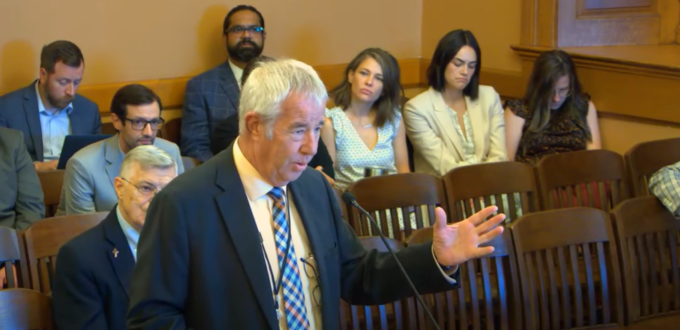by Tim Carpenter, Kansas Reflector
July 20, 2022
TOPEKA — The Kansas Legislature’s auditing agency reported Wednesday the state was losing income tax revenue owed by users of cryptocurrency, but the federal and state government regulators have struggled to come to grips with the complexity and instability of an industry designed to operate in secrecy.
The audit, which focused only on the Kansas taxation issue, exposed challenges faced by government entities attempting to get a handle on digital or virtual currencies and to modify a taxation framework that compelled fewer people to underreport income from transactions.
“Kansas’ tax policies generally aligned with federal policies on cryptocurrency, but we found some of those policies have been difficult to enforce,” said audit manager Matt Etzel.
He said 22 states — not Kansas — introduced bills since 2015 designed to regulate cryptocurrencies. No consensus has emerged among the states on regulatory best practices since only Wyoming and Nevada have implemented statutes along those lines, he said.
The Kansas Department of Revenue reported 20,000 Kansas tax returns out of 1.5 million indicated cryptocurrency transactions in 2021, but auditors suggested that figure underreported actual use by the state’s residents. A Pew Research Center survey found 16% of American adults or 40 million nationwide used cryptocurrencies. The Internal Revenue Service estimated there were 8,600 cryptocurrencies in the marketplace.
“We need to keep looking at this,” said Sen. Robert Olson, an Olathe Republican and chairman of the joint House and Senate auditing committee. “Kansas is probably losing a little bit now, but it will be a lot more in the future.”
Michael Hale, an attorney with the Kansas Department of Revenue, said the IRS continued to wrestle with the emerging, largely unregulated alternative to conventional paper money or a credit card. In 2023, he said, cryptocurrency exchanges would be required to report customer information and transactions to the IRS. That mandate won’t cover transactions by individuals in a multitrillion-dollar market.
Linkages between federal and Kansas tax code were an advantage because the IRS possesses vast resources to improve identification of tax dodgers engaged in the cryptocurrency market and Kansas could draw upon that investigative work, he said.
“The states have been very cautious. Not jumping into waters until they know how deep it is. That’s the approach that Kansas has taken,” Hale said.
His warning: “It is sort of caveat emptor — buyer beware.”
Republicans and Democrats on the Legislative Post Audit Committee said they were interested in further exploring the universe of cryptocurrency in terms of reforming state tax policy and providing neutral information to Kansas consumers.
Sen. Mike Thompson, a Shawnee Republican who has dabbled in cryptocurrency, said availability of Bitcoin, Ethereum and thousands of smaller players in the industry meant people had opportunities to lose a lot of money quickly. He said there were types of investments that could lead to a person “completely losing your shorts,” but he didn’t image the Legislature diving into the cryptocurrency regulation business quickly.
“There’s a lot more research that needs to be done before we ever approach this,” Thompson said.
Individuals are ultimately responsible for making investment decisions but some vulnerable Kansans might benefit from information that educated them about potential pitfalls, said Sen. Ethan Corson, D-Fairway.
Cryptocurrencies can be defined as a digital representation of value used to buy property, goods or services. It can be held and traded as a speculative investment similar to stocks, bonds or foreign currency. Operators of cryptocurrencies rely on complex encryption to secure transactions recorded on a network of blockchains, or digital ledgers, maintained by users.
Kansas Reflector is part of States Newsroom, a network of news bureaus supported by grants and a coalition of donors as a 501c(3) public charity. Kansas Reflector maintains editorial independence. Contact Editor Sherman Smith for questions: info@kansasreflector.com. Follow Kansas Reflector on Facebook and Twitter.

No Comments Yet